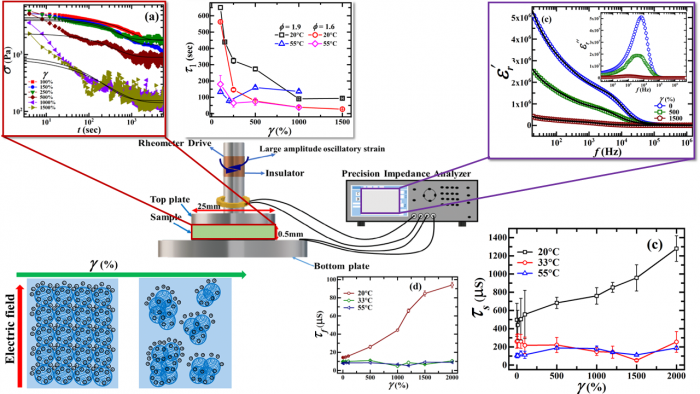Intriguing flow behaviour changes of temperature-responsive polymer can impact their use in electrical energy storage devices
[Posted on 25 November 2022]

Scientists have found intriguing changes in the flow behaviour of colloidal suspension of a temperature-responsive polymer called PNIPAM (poly (N-isopropylacrylamide)) used in gels, microgels, membranes, sensors, biosensors, and thin films when subjected to large deformations.
While their dipoles jam at smaller length scales close to nanometres when large oscillatory deformations are applied, the same suspensions accelerate in their bulk flow. This can have far-reaching implications in the use of colloidal hydrogels in electrical energy storage devices such as flow batteries and flow capacitors.
On account of their thermoresponsivity, suspensions of soft poly (N-isopropylacrylamide) (PNIPAM) particles are useful as smart hydrogel materials and have been widely used as biosensors in thin film technologies and in the biomedical field for controlled and self-regulated drug delivery, bio-conjugation and tissue engineering, etc. Besides, aqueous PNIPAM suspensions are a model system to study the kinetically arrested states of dense colloidal suspensions as they display fascinating flow properties when subjected to large external shear stresses and strains.
While the temperature-dependent phase behaviour of PNIPAM hydrogels have been extensively studied, the dipolar fluctuations in the system (changes in dielectric susceptibilities) due to the application of large externally applied strains have never been investigated. The dipolar fluctuations can help study dynamics of PNIPAM particles at the atomic/ molecular level.
Scientists from the Raman Research Institute (RRI), an autonomous institute of the Department of Science and Technology (DST), probed the dynamics of these hydrogels over extremely wide ranges of length and time scales. They measured the dielectric response of a material in the presence of shear forces (rheo-dielectric studies) on closely-packed PNIPAM suspensions and found that flow behaviour or dynamic properties of closely packed PNIPAM suspensions under large oscillatory stresses changed when the length scale was varied from nanoscale to macroscopic scale. The rheo-dielectric studies are used to determine how shear-induced structural changes alter charge distributions and polarization fluctuations directly.
The scientists attributed the dependence of flow behaviour on length scale (shear-thinning behaviour) to the rupture of fragile clusters of swollen PNIPAM particles triggered by the shear.
“While the restricted motion of the entangled PNIPAM chains under shear increases the dielectric relaxation time, the shear-induced disruption of swollen PNIPAM microstructures accelerates stress relaxation in bulk,” the scientists said, explaining the difference.
The new findings can make smart PNIPAM hydrogels promising materials from the perspective of materials design and processing and also can be studied to uncover the length-scale dependent jamming (slowing down dynamics of PNIPAM particles in dense suspensions due to kinetic constraints imposed on individual entities) and unjamming dynamics of dense glass-forming suspensions.
Publication link: https://doi.org/10.1016/j.jcis.2022.10.002